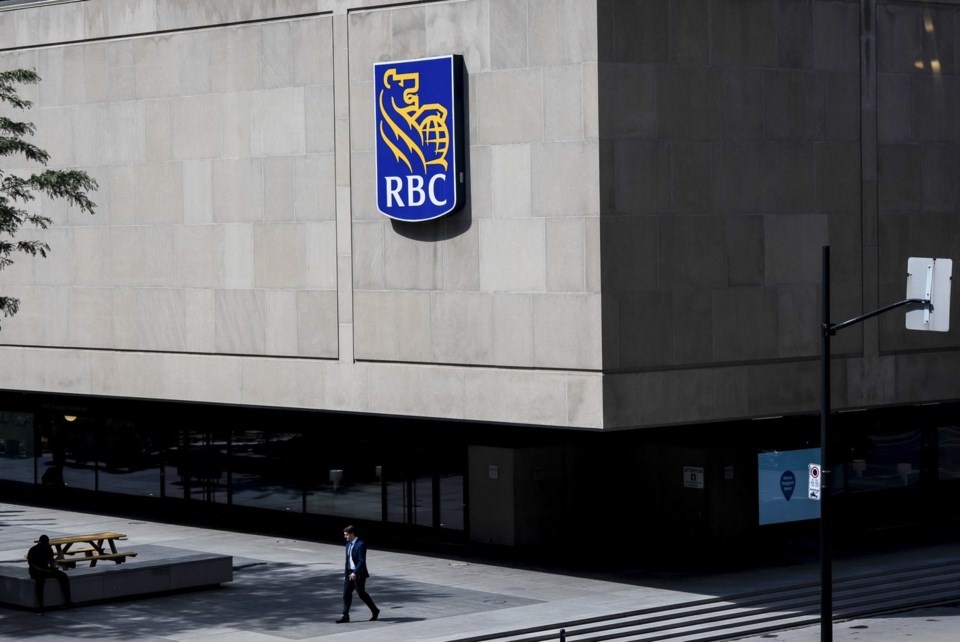The chief risk officer at Royal Bank of Canada says the money it sets aside for potential loan losses is expected to remain elevated for the next few quarters as trade tensions persist, though the economy is showing signs of resilience.
"In the ongoing uncertainty this quarter, we have maintained our prudent posture and retained the elevated weightings to our downside scenarios in line with last quarter," Graeme Hepworth told analysts on a conference call Wednesday to discuss the bank's third-quarter results.
RBC's provision for credit losses for the period reached $881 million, up from $659 million a year earlier.
"We continue to expect PCL and impaired loans to remain elevated for the next few quarters in a similar overall range to what we've experienced over the first three quarters of the year, potentially offset by releases and performing allowances as credit outcomes improve," Hepworth said.
The outlook will depend on how long U.S. President Donald Trump's tariffs last and possible fiscal support and stimulus measures in response, as well as the performance of labour markets, interest rates and real estate prices.
"As always, we continue to proactively manage risk through the cycle, and we remain well capitalized to withstand a broad range of macroeconomics and geopolitical outcomes," Hepworth said.
Earlier Wednesday, Canada's biggest bank by market capitalization reported a third-quarter profit of $5.4 billion, up from $4.5 billion during the same period a year earlier.
The profit amounted to $3.75 per diluted share for the quarter ended July 31, up from a profit of $3.09 per diluted share in the same 2024 period.
Adjusted earnings of $3.84 per share handily beat the average analyst estimate of $3.32 per share, according to LSEG Data & Analytics.
Revenue totalled $16.99 billion, up from $14.63 billion.
RBC shares jumped almost six per cent in afternoon trading on the TSX to $201.68.
During the quarter, the bank's commercial banking division reported a net income of $836 million, up $19 million or two per cent from the same quarter last year.
"Overall, the commercial portfolio continues to be impacted by softer economic conditions and consumer spending in Canada," Hepworth said.
"Elevated impaired provisions over the last 12 months primarily reflect exposure to cyclical supply chain-related sectors like automotive, transportation and industrial products, as well as consumer discretionary and real estate related sectors which have all been impacted by the high rate environment and post-pandemic trends."
The bank's personal banking segment reported net income of $1.9 billion in the quarter, up $352 million or 22 per cent from a year earlier.
RBC Wealth Management reported a quarterly net income of $1.1 billion, up $147 million or 15 per cent from last year. Capital Markets profit was $1.3 billion, up $156 million or 13 per cent from last year.
RBC Insurance had a net income of $247 million, up $77 million or 45 per cent from a year ago.
Chief executive David McKay told the conference call that the bank will closely monitor negotiations related to the Canada-U.S.-Mexico trade agreement.
"We encourage policy-makers on all sides to build on the foundational strengths of current trade agreements, which have provided significant benefits to all parties. Should current CUSMA-compliant goods largely maintain their qualified exemption to tariffs, Canada's effective tariff rate should remain low, and the economy should remain resilient," McKay said.
"However, as trade tensions extend, there may be persistent impacts, including declining consumer confidence, lower corporate profit margins, rising inflation and softening labour markets across both the U.S. and Canada, with uncertain implications to monetary policy and capital flows."
This report by The Canadian Press was first published Aug. 27, 2025.
Companies in this story: (TSX:RY)
Lauren Krugel, The Canadian Press



